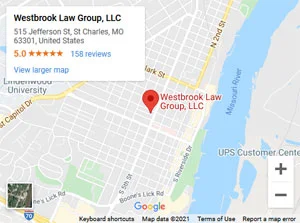Experienced Bankruptcy Attorney in St. Charles, MO
Chapter 7 bankruptcy is the most common form of personal bankruptcy filed in the United States. It is also known as straight bankruptcy. One of the most important people in this process is the bankruptcy trustee.
St. Charles, Missouri, is home to the Westbrook Law Group’s legal professionals, who have years of experience in the relevant industry and currently work there. One of our primary focuses as an organization is to address the concerns raised by bankruptcy trustees and take prompt legal action in this regard. If you have any questions, please do not hesitate to contact us, or you can make an appointment for a consultation that will not cost you anything. We are here for you at any time of the day or night to discuss the many different legal options open to you.
Why do I need a Bankruptcy Trustee in St. Charles, MO.?
 A bankruptcy trustee is one whose responsibility is to supervise the bankruptcy filing process. The United States Trustee Program, housed within the Department of Justice, is responsible for the trustee selection process. These trustees are private individuals with extensive knowledge of business, accounting, management, and bankruptcy-related legal issues. In the Trustee program, the role of a trustee within the legal system is described as a “watchdog over the bankruptcy process.”
A bankruptcy trustee is one whose responsibility is to supervise the bankruptcy filing process. The United States Trustee Program, housed within the Department of Justice, is responsible for the trustee selection process. These trustees are private individuals with extensive knowledge of business, accounting, management, and bankruptcy-related legal issues. In the Trustee program, the role of a trustee within the legal system is described as a “watchdog over the bankruptcy process.”
Depending on the type of bankruptcy that was filed, the Trustee Program will appoint a trustee to oversee the case and the assets when a person files for bankruptcy. The trustee’s responsibilities will vary depending on the type of bankruptcy filed. The trustee is responsible for supervising the activities of the parties involved in the bankruptcy and ensuring that the process is carried out in accordance with applicable laws and the specific type of bankruptcy being handled.
The trustee is compensated monetarily for the services rendered during the administration of the bankruptcy. They can also be reimbursed for reasonable expenses incurred while carrying out their duties.
Call today for a Free Consultation
When you’re in debt, it’s difficult to focus on anything else. But there are steps that you can take to get out of debt – even if your credit is damaged or your income has been cut off completely! Call our St. Charles bankruptcy attorneys at Westbrook Law Group to find out how to escape the shackles of debt and get relief in Missouri.
What is the role of a Chapter 7 Bankruptcy Trustee?
When you submit a Chapter 7 bankruptcy petition, the court will appoint a trustee to oversee your case. The Chapter 7 trustee is selected from a pool of impartial bankruptcy trustees. The trustee will handle your bankruptcy case from the time it is filed until it is discharged, which typically occurs three to four months after the initial filing.
The responsibilities assigned to the trustee of your Chapter 7 bankruptcy case are outlined below.
Review your bankruptcy petition and all supporting documentation.
Your bankruptcy case officially begins when you file your Chapter 7 petition, schedules, and supporting documents with the court. These documents provide the court with information regarding your debts, assets, income, intentions regarding certain types of property and contracts, and financial standing. You must give the trustee income verification (such as six months of pay stubs or a profit-and-loss statement if you are self-employed) and typically two years of tax returns after filing.
The trustee reviews your bankruptcy documents to ensure that you are telling the court the truth and that there are no signs of fraud or abuse. The trustee may request additional information from you if they have questions about your financial situation. If you reported a monthly gross income of $1,500 over the preceding six months, the trustee would examine your pay stubs, bank account statements, and tax returns to ensure consistency.
In your bankruptcy schedules (a component of your bankruptcy filing documents), you are required to list the value of each of your assets. The trustee in bankruptcy will verify the accuracy of your valuations. If something appears out of the ordinary, the trustee’s office will request additional documentation to support the amount listed on your documents.
Oversee the creditors’ meeting.
Additionally, the trustee manages the creditors’ meeting in your bankruptcy case. The meeting of creditors, also known as the 341 hearing, occurs four to six weeks after the filing. The typical length of a 341 meeting is five minutes.
You will be questioned by the bankruptcy trustee at the meeting of creditors after swearing to tell the truth. Creditors may also attend and ask questions, although their presence is rare. The trustee will likely inquire about your income; this provides another opportunity for the trustee to confirm the accuracy and consistency of the information you provided in your schedules. The trustee may also inquire about your property, such as how you determined the worth of your home or car.
If the bankruptcy trustee believes that none of your assets can be sold to repay unsecured creditors, they will likely declare that you have “no assets.” If your case has no assets, the trustee will file a report stating that there will be no distributions to creditors.
Sell your nonexempt assets.
In Chapter 7 bankruptcy, the trustee is responsible for selling the nonexempt assets of the debtor in order to repay unsecured creditors. Nonexempt assets are those that are not protected by exemption laws. The trustee cannot touch property that is protected by an exemption statute.
Reverse Certain Pre-Bankruptcy Property Transfers
In certain circumstances, the Chapter 7 trustee may recover property you transferred to a third party prior to filing for bankruptcy (also called a preferential transfer). Prior to filing for bankruptcy, it is against the law to conceal assets or favor one creditor over another. In such a case, the trustee may reclaim the property for distribution among your creditors.
Contests Null and Void Security Interests and Liens
If the trustee believes a lender’s security interest or lien is invalid, they may also contest it. When you purchase property with credit, such as a house or car, you often grant the lender a security interest or lien on the property. On occasion, the creditor makes an error on the lien or security interest evidence document. For instance, the lender may have missed an essential signature or improperly recorded or filed the document. If such a flaw exists, the trustee may be able to invalidate the lender’s interest and sell the property for the benefit of all creditors.
Call our St. Charles Bankruptcy Attorneys Now!
The initial consultation is the best next step for you to take if you want more information on the Chapter 7 Bankruptcy Trustee. Call the Westbrook Law Group right now to get the information and answers to the legal questions that you are looking for.


